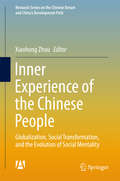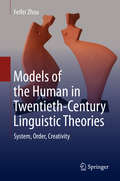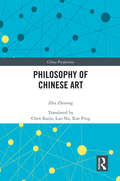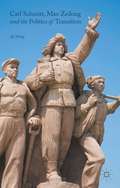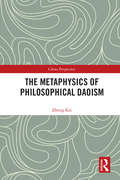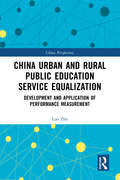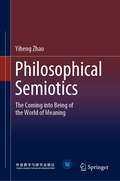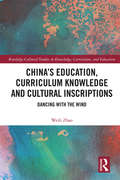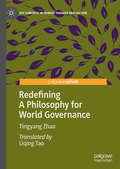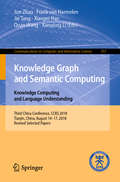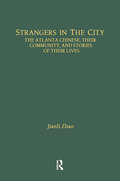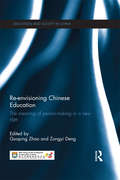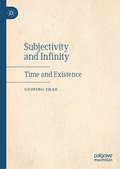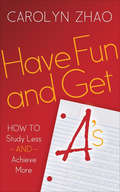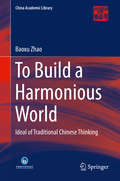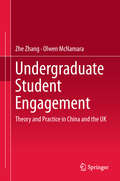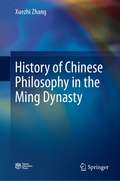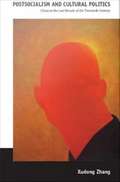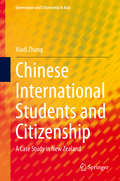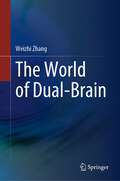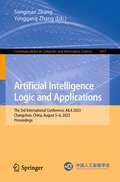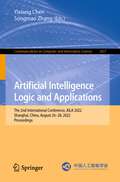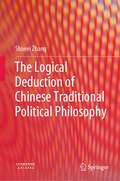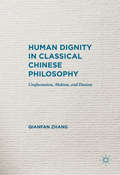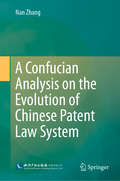- Table View
- List View
Inner Experience of the Chinese People
by Xiaohong ZhouThis book comprehensively explores the changes in the Chinese spiritual world from the perspective of transition and transformation. Chinese feeling, a brand-new concept corresponding to Chinese experience, refers to the vicissitudes that 1. 3 billion Chinese people have been through in their spiritual worlds. The book discusses this concept together with Chinese experience, two aspects of the transformation of the Chinese mentality that resulted from the unprecedented social changes since 1978, and which have given this unique era historical meaning and cultural values. At the same time they offer a dual perspective for understanding this great social transition. Further, the book considers what will happen if we only focus on the "Chinese Experience" while neglecting the "Chinese Feeling"; the changes the Chinese people undergo when their desires, wishes and personalities have changed China; and how their emotionally charged social mentality follow eb bs and flows of the changing society. Lastly it asks what embarrassment and frustration the population will be faced with next after the tribulations their spiritual world has already been through.
Models of the Human in Twentieth-Century Linguistic Theories: System, Order, Creativity
by Feifei ZhouThis book provides a refreshingly new perspective for investigating linguistic texts, which foregrounds models of the human. It presents a close reading of major linguistic theories in the twentieth century with a focus on three main themes: linguistic system and the individual speaker; social order; and linguistic creativity. The examination of these three fundamental themes concerning language and human nature, on the one hand, provides a fine-textured exposition on the implicit and explicit models of human nature endorsed by major theorists; on the other, it reveals the methodological dilemmas faced by linguistics. In light of the fact that the importance of considering posthumanist ideas is increasingly being underscored today, both within and outside linguistics, this focus on the human makes the book highly topical.
Philosophy of Chinese Art (China Perspectives)
by Zhu ZhirongThis title provides a systematic examination of the philosophy of Chinese art, exploring the peculiarity of artistic forms and distinctive conceptions and artistic principles of Chinese art which are grounded in the life awareness of the ancient Chinese and interconnect with the Chinese philosophy of life.Synthesizing Chinese theories of art with Western philosophical systems, the book is organized into five parts: (1) the subject, the actor who creates, appreciates, and criticizes artistic works; (2) ontological aspects, that is, the artwork per se and the dynamic process of creation; (3) aesthetic traits, the organic whole constituted by rhythm, meter, the principle of harmony, and space-time awareness; (4) artistic representation, which is manifested in the rhythm of vital energy, momentum of genre, vigour of style, and taste and inclination; and (5) the evolution of Chinese art. Based on this structural thread, the author looks into the interwoven relationship between the philosophy of Chinese art and ancient Chinese thought in terms of the spirit of life, nature–human relations, and ontological awareness of human-centredness.The book will appeal to scholars, students, and general readers interested in aesthetics, art theory, art philosophy, Chinese art, and ancient Chinese culture.
Carl Schmitt, Mao Zedong and the Politics of Transition
by Qi ZhengThis book develops a new way of reading and benefiting from Schmitt's legal and political theories. It explores Schmitt's theories from the perspective of what I refer to as the politics of transition. It also contributes to identifying the real theoretical relationship between Schmitt and Mao.
The Metaphysics of Philosophical Daoism (China Perspectives)
by Kai ZhengDrawing on evidence from a wide range of classical Chinese texts, this book argues that xingershangxue, the study of "beyond form", constitutes the core argument and intellectual foundation of Daoist philosophy. The author presents Daoist xingershangxue as a typical concept of metaphysics distinct from that of the natural philosophy and metaphysics of ancient Greece since it focusses on understanding the world beyond perceivable objects and phenomena as well as names that are definable in their social, political, or moral structures. In comparison with other philosophical traditions in the East and West, the book discusses the ideas of dao, de, and "spontaneously self-so", which shows Daoist xingershangxue’s theoretical tendency to transcendence. The author explains the differences between Daoist philosophy and ancient Greek philosophy and proposes that Daoist philosophy is the study of xingershangxue in nature, providing a valuable resource for scholars interested in Chinese philosophy, Daoism, and comparative philosophy.
China Urban and Rural Public Education Service Equalization: Development and Application of Performance Measurement (China Perspectives)
by Luo ZheCentering on issues of disparity and equality in basic public education services in China, this book proposes a performance measurement system that assesses and guides equality of basic public education in urban and rural areas. The author moves beyond traditional research approaches by drawing on methods of public management and mathematics. Pivoted on an improved balanced scorecard model, a complete set of indicators and measuring tools are constructed, whereby the process of education equality can be more effectively measured, managed, and steered. Grounded in empirical studies on public education in the country's Sichuan Province, the book advances suggestions on better policies and optimizing implementation for the purpose of attaining equitable public education services in urban and rural areas. Finally, the study envisages further research directions and possible applications of the performance appraisal model. The title will be of value to scholars and students of education studies, especially those interested in public education, educational equity, and Chinese public education services.
Philosophical Semiotics: The Coming into Being of the World of Meaning
by Yiheng ZhaoThis book attempts to solve the question whether semiotics is a methodology as is generally held and if the studies of meaning and the mind can shed light on a series of metaphysical issues, so that the edifice of semiotics could be erected on a philosophical ground. It proposes that a philosophical semiotics is, by necessity, a semiotic phenomenology about the construction of the “world of meaning” by signs, and any discussion about semiotics has to proceed around two core issues: meaning and the mind.This book particularly exemplifies the semiotic connections in various schools of traditional Chinese philosophies. In the “Pre-Imperial Age” (before BC 300), there emerged an abundance of semiotic thinking in China, from Yijing the first sign system that aims to explain everything in the world, to the Namists’s subtle argument about the form of meaning, from the Yin-Yang/five elements of the Han, to the “Things are non-existent while mind is non-non-existent” principle of the Vijñāptimātratāsiddhi School of Buddhism in the Tang, and from the Sudden Revelation of Chan Buddhism to the “Nothing outside the mind” endorsed by the Mindist Confucianism in the Ming. The mighty trend of philosophical heritage provides rich food to our understanding of the form of meaning.
China’s Education, Curriculum Knowledge and Cultural Inscriptions: Dancing with The Wind (Routledge Cultural Studies in Knowledge, Curriculum, and Education)
by Weili ZhaoWith a focus on the role of discourse and language in education, this book examines China’s educational reform from an original perspective that avoids mapping on Westernized educational sensibilities to a Chinese environment. Zhao untangles the tradition-modernity division expressed in China’s educational language about the body and teacher-student difference. Exploring the historical and cultural implications of the ways China’s schooling is talked about and acted upon, Zhao argues that Chinese notion "wind" (feng) is a defining aspect of Chinese teaching and learning. Incorporating Western and Chinese literature, this book explores the language of education, curriculum, and knowledge on a cross-cultural landscape and as cultural inscriptions.
Redefining A Philosophy for World Governance (Key Concepts in Chinese Thought and Culture)
by Tingyang ZhaoThis Key Concepts pivot discusses the contemporary relevance of the ancient Chinese concept of Tianxia or ‘All-Under-Heaven’ and argues the case for a new global political philosophy. ‘All-under-heaven’ is a conceptualization of the world as the composition of three realms: the physical, psychological and political, which places inclusivity and harmony at the heart of a global world view above other considerations, transcending the notion of nation state. In a highly interconnected and globalized world, the idea of Tianxia can offer a new 21st century vision of international relations and world order, based on a harmonized global organization defined by the “all-inclusiveness principle.” Promoting the ontology of co-existence and relational rationality hand in hand with rational risk aversion in a globalized world, this pivot makes the case that Tianxia could offer a new vision for contemporary world order, redefining the universality and legitimacy of politics.
Knowledge Graph and Semantic Computing. Knowledge Computing and Language Understanding: Third China Conference, CCKS 2018, Tianjin, China, August 14–17, 2018, Revised Selected Papers (Communications in Computer and Information Science #957)
by Jun Zhao Frank Van Harmelen Jie Tang Xianpei Han Quan Wang Xianyong LiThis book constitutes the refereed proceedings of the Third China Conference on Knowledge Graph and Semantic Computing, CCKS 2018, held in Tianjin, China, in August 2018.The 27 revised full papers and 2 revised short papers presented were carefully reviewed and selected from 101 submissions. The papers cover wide research fields including the knowledge graph, information extraction, knowledge representation and reasoning, linked data.
Strangers in the City: The Atlanta Chinese, Their Community and Stories of Their Lives (Studies in Asian Americans)
by Jianli ZhaoBased largely on interviews from residents of Atlanta's Chinese community, this book provides new insights on the rise of Asian communities in the Southeast United States since the US immigration policy changes in 1965.
Re-envisioning Chinese Education: The meaning of person-making in a new age (Education and Society in China)
by Guoping Zhao Zongyi DengMaintaining education as a pedagogical space for human formation, this book is distinctive in looking at the crisis rather than the success of Chinese education. The editors and contributors, mostly overseas and mainland Chinese scholars, argue that modern Chinese education has been built upon a superficial and instrumental embrace of Western modernity and a fragmented appropriation of Chinese cultural heritage. They call for a rethinking and re-envisioning of Chinese education, grounded in and enriched by various cultural traditions and cross-cultural dialogues. Drawing on Chinese history and culture, Western and Chinese philosophies, curriculum and pedagogical theories, the collected volume analyzes (1) why education as person-making has failed to take root in contemporary China, (2) how the purpose of education has changed during the process of China’s modernization, and (3) what a rediscovery of the meaning of person-making implies for rethinking and re-envisioning Chinese education in the current age of globalization and social change. Re-envisioning Chinese Education: The meaning of person-making in a new age discusses among other issues: China’s Historical Encounter with the West and Modern Chinese Education Rediscover Lasting Values: Confucian Cultural Learning Models in the Twenty-first Century Rethinking and Re-envisioning Chinese Didactics: Implications from the German Didaktik Tradition The New Basic Education and the Development of Human Subjectivity: A Chinese Experience This book will be relevant for scholars, researchers, and policy makers everywhere who seek a more balanced, more sophisticated, and philosophically better grounded understanding of Chinese education.
Subjectivity and Infinity: Time and Existence
by Guoping ZhaoThis book formulates a new theory of subjectivity in the context of the claimed “death of the subject” in the post-modern and post-human age. The new theory is developed against the conception of the subject as a transcendental ego whose constitutive roles, recognition, and representation lead to the objectivization and totalization of the world and denial of its inner infinity and heterogeneity. Critically scrutinizing ideas from Bergson, James, Husserl, Heidegger, Derrida, Zen Buddhism, and Chinese Zhuangzi, and through an analysis of time and temporality, this book advances a number of new concepts, including “primal sensibility” and “pure experience,” and proposes a porous structure of subjectivity with an ex-egological and ex-subjective zone that allows nothingness and absence to ground presence. Such a theory of subjectivity provides the basis for an understanding of thinking as imagination and self-identity as narrative presentation in the intersubjective world.
Have Fun and Get A's: How to Study Less and Achieve More
by Carolyn ZhaoHigh school students are experiencing more pressure and stress than ever before. How can parents and teachers help them succeed not just in school, but in life? Author and university teacher Carolyn Zhao knows from experience that the answer isnt just to stay up later and study harder. It is possible to have fun---and get As! Sharing her method that transformed her own son from a struggling high school student into an Ivy League freshman, Zhao explains that a quality education is not just about achieving high marks, but becoming a well-rounded individual---and top universities and employers are actively seeking such students right now. In "Have Fun and Get As", Zhao reveals: Why developing your Emotional Quotient (EQ) is just as important as IQ How to combine intellectual learning with hands-on practice for best retention How to study less and achieve more Why playing sports is crucial for mind, body, and character How having fun develops our creative mind and highest potential How to develop a lifelong service mindset "Have Fun and Get As" encourages parents and teachers to help our youth become agents of change, not victims of it. It also empowers young people to take charge of their own transformation by dreaming big and developing the right mindset for success. Discover how to develop your potential, so you can reap the rewards for a lifetime!,
To Build a Harmonious World
by Baoxu ZhaoThis book collects the work of Zhao Baoxu, a prominent scholar of political science, international political scientist and educator. It features more than 14 papers that fully explore the political thoughts of Professor Zhao, who was deeply rooted in his concern for China, its people and the world. Going through the vicissitudes in both the 20th and the 21st centuries, Mr. Zhao witnessed and experienced the twists and turns in the birth and development of political science in China. He also participated and promoted the restoration and advancement of contemporary political science in China. Roaming widely in the studies on social science, philosophy, politics, culture and international relations, he spared no effort to explore the political nature and development trend of human society and the path to rejuvenate China and lead the nation towards a high level of civilization. In addition, he ardently appealed for world peace and common development. Inside this book, readers will discover rich and profound political thoughts, intellectual treasures in the area of social culture and political science in China. Professor Zhao's work offers scholars a unique insight into understanding and grasping the history and development of socialism with Chinese characteristics.
Undergraduate Student Engagement: Theory and Practice in China and the UK
by Zhe Zhang Olwen McNamaraThis book focuses on undergraduate student engagement in China and the UK. It offers an innovative perspective on this aspect, which, although pervasive, is not always acknowledged by its users to be complex and multidimensional in nature, firmly rooted in cultural, social and disciplinary norms, and difficult to measure. Competition within the global higher education market has become increasingly intense amongst universities; and the higher education sector in China, currently the largest source of international students, is beginning to compete strongly for its home market. Against this consumerist background, student engagement, with its close relation to positive learning outcomes, is increasingly receiving attention from higher education managers and researchers who seek to improve the quality of their ‘products’.The research study on which the book is based draws on three courses, two in China and one in the UK. It offers a binary perspective across two very different cultures (Western and Confucian) and two very different subject areas (Chinese language and mathematics). The study employs a mixed-methods design and develops a conceptual framework derived from statistical and thematic analysis. An original theoretical lens, combining a bioecological perspective (Bronfenbrenner) and a sociocultural one (Holland et al.’s Figured Worlds), adds further interpretive power to help understand the construct of student engagement.
History of Chinese Philosophy in the Ming Dynasty
by Xuezhi ZhangThis book starts with the classification of the main views of different thinkers after the study of the original materials, which covers all the thinkers’ thoughts and conceptions. A major objective of this book is to reveal the ideas of the philosophers. Key ideological opinions are stated with the former discussion of exact questions and further clarification of their philosophical meaning, which enables the readers to better understand the meaning and value of the philosophical thoughts. Since the logic and history are in accordance with each other, a frame of conception is formed then. Then, the author clearly explains the logical relationship in the frame mentioned before, as well as the formation of the key concepts and their relationship.
Postsocialism and Cultural Politics: China in the Last Decade of the Twentieth Century
by Xudong ZhangIn Postsocialism and Cultural Politics, Xudong Zhang offers a critical analysis of China's "long 1990s," the tumultuous years between the 1989 Tiananmen Square crackdown and China's entry into the World Trade Organization in 2001. The 1990s were marked by Deng Xiaoping's market-oriented reforms, the Taiwan missile crisis, the Asian financial crisis, and the end of British colonial rule of Hong Kong. Considering developments including the state's cultivation of a market economy, the aggressive neoliberalism that accompanied that effort, the rise of a middle class and a consumer culture, and China's entry into the world economy, Zhang argues that Chinese socialism is not over. Rather it survives as postsocialism, which is articulated through the discourses of postmodernism and nationalism and through the co-existence of multiple modes of production and socio-cultural norms. Highlighting China's uniqueness, as well as the implications of its recent experiences for the wider world, Zhang suggests that Chinese postsocialism illuminates previously obscure aspects of the global shift from modernity to postmodernity. Zhang examines the reactions of intellectuals, authors, and filmmakers to the cultural and political conflicts in China during the 1990s. He offers a nuanced assessment of the changing divisions and allegiances within the intellectual landscape, and he analyzes the postsocialist realism of the era through readings of Mo Yan's fiction and the films of Zhang Yimou. With Postsocialism and Cultural Politics, Zhang applies the same keen insight to China's long 1990s that he brought to bear on the 1980s in Chinese Modernism in the Era of Reforms.
Chinese International Students and Citizenship: A Case Study in New Zealand (Governance and Citizenship in Asia)
by Xiudi ZhangThis book investigates how Chinese international students reconfigure their sense of themselves as citizens when they reflect on what Chinese citizenship means in the context of New Zealand. Adopting a case study approach, it develops a theory relating to the thoughts of Chinese international students; the theory is based on the communities, schools, family and state relationships of both their past and their contemporary daily experiences. It finds that the struggles of Chinese young people lie in between being individuals and submitting to the general will of the family, state and guanxi (a Chinese concept of interpersonal relationships). The book argues that the Western literature on citizenship is not sufficient in helping us understand how it is viewed in the Chinese contexts.It offers readers a picture of what citizenship means for Chinese young people and the role of citizenship education in Modern Chinese society, and demonstrates that the Chinese young people studied re-educated themselves on citizenship in a way that is unstable and emotional. This book makes important contributions to the literature on Chinese students who are studying abroad by going beyond the well-researched topics of academic and social experience to explore deeper understandings of each individual student’s relationship to family and the state in China and how the study abroad experience has developed new understandings of individual’s relationships to China, and new possibilities for contributing to Chinese society on return.
The World of Dual-Brain
by Weizhi ZhangThis book leaves the template of the inertia of natural human society and traditional ideological thinking, to illustrate the mechanism of the generation of the Sociality Brain and to explore the construction path of the human-computer symbiosis order. At the same time, this book proposes concepts including ‘wisdom sharing system’, ‘the Sociality Brain’, ‘dual-brain world’, ‘off-site economic civilization’, ‘basic contradictions in the intelligent world’, and ‘class analysis and division of the dual-brain world’, etc. This is a philosophical thinking about the intelligent world beyond the categories of natural human society and biological brain.
Artificial Intelligence Logic and Applications: The 3rd International Conference, AILA 2023, Changchun, China, August 5–6, 2023, Proceedings (Communications in Computer and Information Science #1917)
by Songmao Zhang Yonggang ZhangThis book constitutes the proceedings of the Third International Conference, AILA 2023, held in Changchun, China, during August 5–6, 2023. The 26 full papers and the 10 short papers included in this volume were carefully reviewed and selected from 56 submissions. This volume aims to provide novel ideas, original research achievements, and practical experiences in a broad range of artificial intelligence logic and applications.
Artificial Intelligence Logic and Applications: The 2nd International Conference, AILA 2022, Shanghai, China, August 26–28, 2022, Proceedings (Communications in Computer and Information Science #1657)
by Songmao Zhang Yixiang ChenThis book constitutes refereed proceedings of the 2nd International Conference on Artificial Intelligence Logic and Applications 2022 held in Shanghai, China from August 26–28, 2022.The 20 full papers presented in this volume were carefully reviewed and selected from a total of 27 submissions. The papers in the volume are organised according to the following topical headings: program logic; fuzzy logic; applications; author index.
The Logical Deduction of Chinese Traditional Political Philosophy
by Shiwei ZhangThis book presents a panoramic and extensive exploration of Chinese political philosophy, examining key political problems of the past, and the thinkers who addressed them. As the reader will discover, China’s traditional political philosophy is one with distinctive national characteristics and ideals. Therefore, the book helps to clarify the evolution of Chinese political thought, while also investigating fundamental political issues throughout the country’s history. The book offers a unique resource for researchers and graduate students in the fields of political science, philosophy, and history, as well as ordinary readers who are interested in China’s traditional and political culture.
Human Dignity in Classical Chinese Philosophy
by Qianfan ZhangThis book reinterprets classical Chinese philosophical tradition along the conceptual line of human dignity. Through extensive textual evidence, it illustrates that classical Confucianism, Mohism and Daoism contained rich notions of dignity, which laid the foundation for human rights and political liberty in China, even though, historically, liberal democracy failed to grow out of the authoritarian soil in China. The book critically examines the causes that might have prevented the classical schools from developing a liberal tradition, while affirming their positive contributions to the human dignity concept. Analysing the inadequacies of the western concept of human dignity, the text covers relevant teachings of Kongzi, Mengzi, Xunzi, Mozi, Laozi and Zhuangzi (in comparison with Rousseau). While the Confucian notions of humanity (Ren), righteousness (Yi), and gentleman (Junzi) bear most directly on the conception of dignity, Mohism and Daoism provide salutary corrections to the ossification of the orthodox Confucian practice (Li).
A Confucian Analysis on the Evolution of Chinese Patent Law System
by Nan ZhangThis book comprehensively discusses the main features of the Chinese patent law system, which not only legally ‘transplants’ international treaties into the Chinese context, but also maintains China’s legal culture and promotes domestic economic growth. This is the basis for encouraging creativity and improving patent law protection in China. The book approaches the evolution of the Chinese patent system through the ancient Chinese philosopher Confucius’s classic principle, offering readers a fresh new way to understand and analyze Chinese patent law reforms, while also outlining how Confucian insights could be used to improve the enforcement of patent law and overall intellectual property protection awareness in China. It examines ancient Chinese innovation history, explores intellectual property from a Confucian perspective, and discusses the roots of Chinese patent law, as well as the past three amendments and the trends in the ongoing fourth amendment. In addition to helping readers grasp the mentality behind the Chinese approach to patent law and patent protection, the book provides an alternative research methodology and philosophical approach by demonstrating Confucian analysis, which provides a more dynamic way to justify intellectual property in the academic world. Lastly, it suggests future strategies for local industries in the legal, cultural and sociological sectors in China, which provide benefits for domestic and overseas patent holders alike. The book offers a valuable asset for graduate students and researchers on China and intellectual property law, as well as general readers interested in Asian culture and the philosophy of law.
